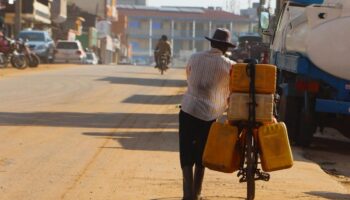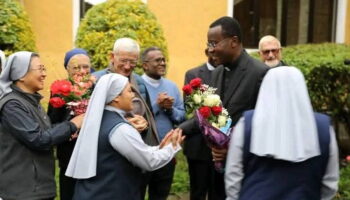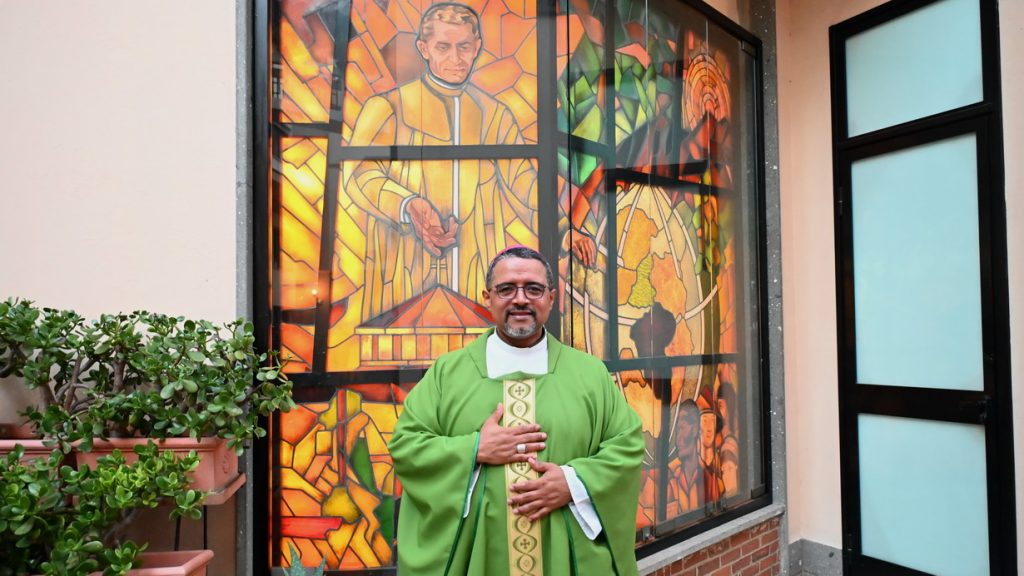
Pope Francis has appointed the Consolata missionary, Msgr. Lisandro Alirio Rivas Durán bishop of San Cristóbal de Venezuela (Venezuela), until now he was auxiliary bishop of the Metropolitan Archdiocese of Caracas. In an interview with our Communications Office in Rome, the bishop spoke about the Church’s mission facing the grave social and political situation in Venezuela.
By Jaime C. Patias *
A few days ago, Msgr. Lisandro Rivas was in Rome to participate in the canonization of Saint Joseph Allamano and spoke about the social and political situation of Venezuela and the mission of the Church in a country that in recent years has been experiencing a serious economic, social and political crisis. Let’s listen to the bishop in Spanish.
The Holy Father has accepted the resignation from the pastoral care of the diocese of San Cristóbal de Venezuela, presented by Bishop Mario del Valle Moronta Rodríguez, on 10 February, on the occasion of his 75th birthday, as reported by the Holy See Press Office in the daily bulletin of 31 October 2024. At the same time, Msgr. Lisandro Rivas, until now titular Bishop of Dardano and Auxiliary Bishop of Caracas, was appointed Bishop of the same diocese.
“At this moment I am accompanying the poorest people in the neighborhoods on the outskirts of Caracas. When the Holy Father appointed me bishop, I began to enter into this complex, difficult and demanding reality,” explains the bishop. “After July 28, 2024, when the presidential elections were held, we have a different Venezuela, due to the situation of violence, violation of human rights and the dignity of the human person in his fundamental rights to life, education, freedom of expression and the right to freely choose the destiny of the country.”

Bishop Lisandro says that the elections were “an extraordinary experience of democracy, because so many people expressed their preferences, but what we experienced after the runoff was a great electoral fraud.” The National Electoral Council (CNE) declared the victory of President Nicolás Maduro, leaving out Edmundo González Urrutia, who was elected by the great majority.”
Even in the face of international pressure, the regime of Nicolás Maduro has still not presented the minutes showing the results of the elections. Since the principle of transparency has not been respected, many countries do not recognise the proclaimed victory of the current president with 51.2% of the vote. The opposition has not recognised the result and speaks of irregularities.
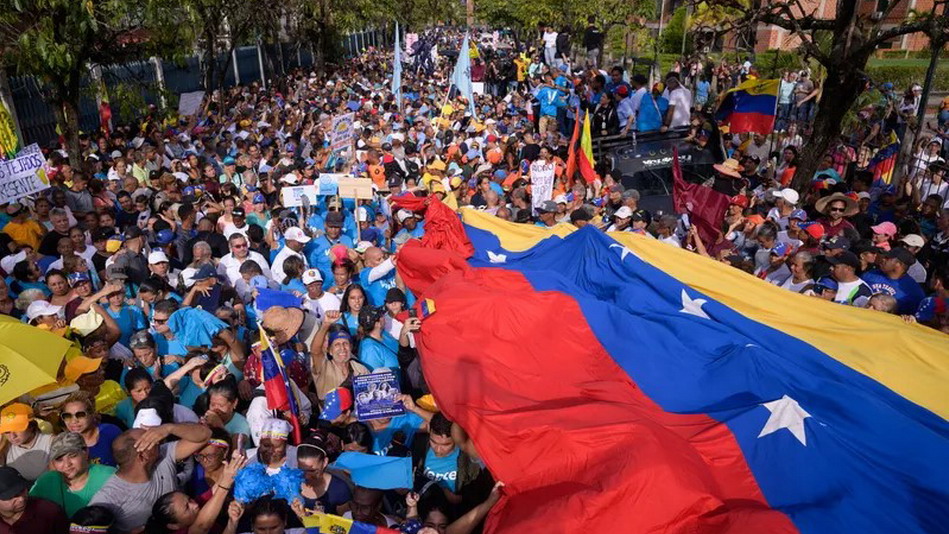
“This has had serious consequences,” the bishop explains. “First of all, there is a persecution of all those who opposed this decision: many young people, more than 1,200, especially minors, have been arrested by the police. At the same time, those who participated in demonstrations have been persecuted. This has had consequences at the economic, political and social levels, and above all in terms of migration, it is expected that by the end of this year more than 9 million Venezuelans will leave the country in search of opportunities, leaving a huge void. Only children, adolescents and the elderly will be left in the country. The workforce is gone.”
Monsignor Lisandro Rivas also spoke about the challenges the Church is facing. “The Church, which has always accompanied the people, is on the side of those who suffer and is also an expression of hope with concrete actions. Faced with hunger, the Church seeks to feed the hungry by strengthening solidarity so that people can take home some food. Caritas also takes care of health with the distribution of medicines and days of medical assistance”.

The voice of the Venezuelan bishops
“The Church has always spoken out through press releases, especially after the last elections, making its prophetic mission felt from a moral and ethical point of view,” emphasizes Bishop Lisandro. “The Church is also trying to reflect on how to deal with this reality. One thing that is clear to us as pastors is that we must accompany the people who cry out to heaven begging for justice in terms of human dignity and fundamental rights. As a Church, we are part of this people and we are a sign of hope. As pastors, we must be with the people in the places where they cry out, sometimes in front of the people, sometimes in the middle, sometimes behind, so as not to allow anyone to take the wrong path,” reiterates the bishop.
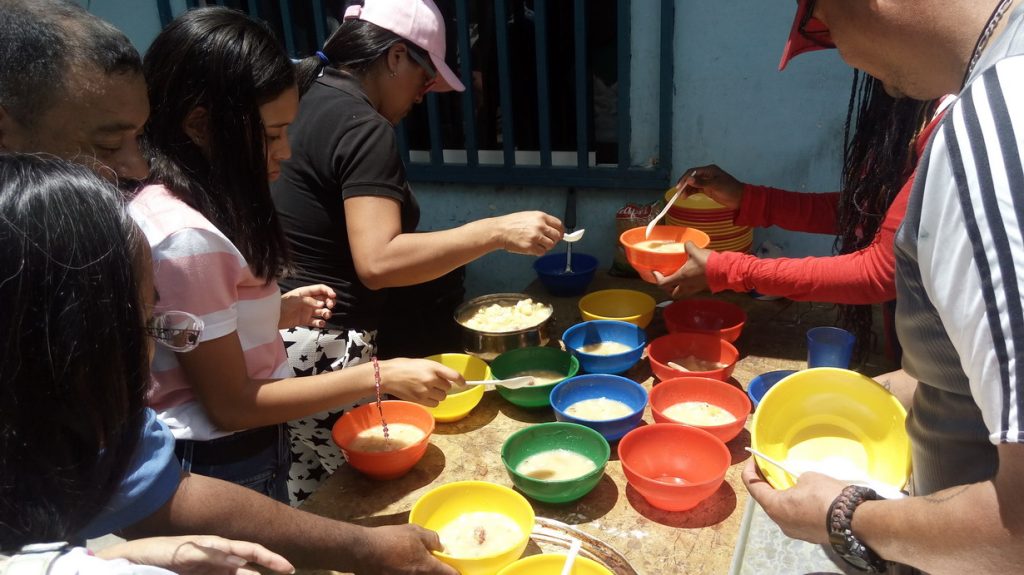
Bishop Lisandro sees the future of Venezuela as uncertain and it is not known when there will be a change in the presidency. “The mission of the Church in the different scenarios is to continue accompanying the people who want an alternative to the current situation. The people who come out to demonstrate are those who live in the outskirts of Caracas and who previously supported ‘Chavismo’, but who today are suffering the greatest consequences of what is happening. As a Church, we are called to be missionary disciples in the existential outskirts as a sign of hope that accompanies the people in the search for solutions for the good of Venezuela,” concludes the bishop.
Thanksgiving and prayers
The press office of the Diocese of San Cristóbal shared the words of Bishop Mario del Valle, who encouraged the community to welcome Bishop Lisandro Rivas with affection and prayers: “Welcome him with affection, enthusiasm and as a son of Táchira… I ask you with all my heart to pray for him and for his ministry at this time.” Msgr. Lisandro Rivas is the sixth bishop of the diocese and expressed gratitude to Pope Francis for his appointment: “The Holy Father truly surprised me with this news, which makes me go out to meet the people who are on pilgrimage to San Cristóbal.”
Diocese of San Cristóbal
Erected by Pope Pius XI on October 12, 1922, the diocese of San Cristobal is located in the state of Táchira, on the border with Colombia, and is a suffragan of the archdiocese of Mérida. During these 100 years of history it has founded the Catholic Newspaper, the St. Thomas Aquinas Seminary, the Catholic University of Táchira, several Catholic schools, 94 parishes, and three churches have been elevated to minor basilicas. Currently, the diocese has 173 priests, including several Redemptorists, Augustinians, Franciscans and Dominicans, among others, and 225 seminarians. Msgr. Juan Alberto Ramírez, has been the auxiliary bishop, since 2020.
Brief biography of the new bishop of San Cristóbal

Bishop Lisandro Alirio Rivas was born on July 17, 1969 in Boconó, in the state of Trujillo. In 1985 he entered the Consolata Philosophical Seminary. At the end of his novitiate, he made his religious profession on January 7, 1990 in Bucaramanga (Colombia) and his perpetual profession on December 3, 1994. From 1990 till 1995 he studied theology in London (UK) and on August 19, 1995 he was ordained a priest in his hometown and left for the mission to Kenya where he worked until 2000; upon his return to Venezuela he was responsible for formation and made rector of the Philosophical Seminary; vice superior and superior of his own congregation; rector of the Theological Seminary of Bogotá in Colombia; and in 2014 named rector of the Pontifical College of Saint Paul in Rome.
On December 23, 2021, he was appointed titular bishop of Dardano and auxiliary of the metropolitan archdiocese of Caracas and received episcopal ordination on March 12, 2022.
Within the Venezuelan Episcopal Conference, he is director of the National Pastoral Institute (INPAS), a member of the Episcopal Commission for Consecrated Life and the Commission for Missions, Indigenism and Afro-Americans.
* Father Jaime C. Patias, IMC, General Communications, Rome.

